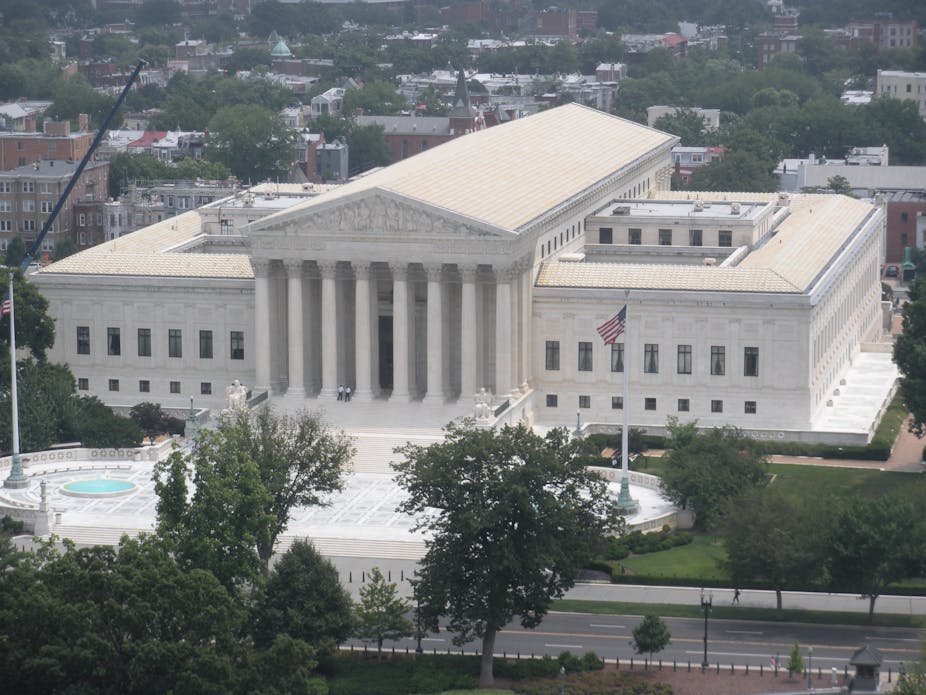The US Supreme Court has handed down a landmark decision that will have drawn sighs of relief from corporate boardrooms in Australia and around the world.
Kiobel v. Royal Dutch Petroleum was brought by Nigerian citizens (now residing in the United States), alleging that Royal Dutch Petroleum, Shell and their local subsidiary aided and abetted the Nigerian government to commit serious human rights abuses against the local Ogoni people of the oil-rich Niger Delta in the 1990s.
The case was brought under the Alien Tort Statute (ATS) – an obscure law that was passed by the first US Congress in 1789 in an effort to combat piracy. The ATS states that US courts:
have original jurisdiction of any civil action by an alien for a tort only, committed in violation of the law of nations or a treaty of the United States.
In the past two decades, human rights activists rediscovered the little-used ATS and employed it as a means to hold large multi-national corporations accountable for human rights abuses committed in far-flung countries.
Australian companies have not been immune from this wave of ATS litigation. One of the highest-profile ATS cases in the US involved allegations against Australian mining company, Rio Tinto, for environmental destruction of Bougainville’s environment and complicity in serious human rights abuses committed by the Papua New Guinean government when it used military force to quell an island uprising.
Rio Tinto had appealed to the US Supreme Court, but the appellants in Kiobel beat them to the punch. And so it was Kiobel that became the vehicle for the US Supreme Court to consider the limits of the ATS. Now, due to their decision, it seems highly unlikely that Rio Tinto will ever need to plead their case before the US Supreme Court.
The US Supreme Court decided that the “presumption against extra-territoriality applies” to claims brought pursuant to the ATS. In simple terms, the court has decided that you cannot employ the ATS to sue foreign companies for conduct in foreign lands in US courts any longer.
A key plank in the court’s reasoning was its wariness to entangle US courts in matters with “direct foreign policy consequences” for the US government. Incidentally, in reaching their decision the court relied upon their own 2010 decision in Morrison v. National Australia Bank – yet another case involving an Australian-based corporate defendant.
In the months to come, as human rights activists and victims of atrocities come to grips with the shutting down of one promising legal avenue in which to pursue justice, they will necessarily be searching for another forum in which to do so. And they just might find it here in Australia.
Indeed, Australia may very well become the epicentre of the next round of corporate accountability trials.
Australian courts are a potentially fertile, but largely untested, ground for pursuing human rights litigation against corporations, Australian or foreign. Nevertheless, potential criminal and civil legal claims are foreseeable in Australian courts against today’s corporate wrongdoers.
Australia is a signatory to the Rome Statute that established the International Criminal Court and as such has incorporated international crimes into Australian criminal law. Under these criminal laws domestic Australian courts have the authority to prosecute people and corporations for international crimes, including crimes against humanity, war crimes and genocide. Importantly, companies could be held to account for complicity in any such crimes committed by governments or militaries of countries where they operate.
There is also potentially a range of civil claims that victims of such heinous crimes could bring against any alleged corporate bad actors, seeking monetary compensation from them. While Australia does not have a statute equivalent to the ATS, ordinary tort law might be utilised.
Many of the judicial hurdles to succeed in an ATS claim are not applicable to the Australian legal scene. Australian has a looser notion of forum non conveniens, a principle that requires a claim to be brought in the most appropriate forum, which makes it more amenable to cases involving misconduct in foreign countries.

The presumption against extra-territoriality that the US Supreme Court has employed to gut the ATS of much of its force, is turned on its head in the Australian context. That is, the relevant provisions of the Australian criminal code are explicitly extra-territorial in nature. The intent behind their incorporation was precisely to proscribe certain conduct wherever it may occur on the globe in Australia or elsewhere, unbounded by Australian territorial jurisdiction. Although there is a question of whether Australian courts can exercise universal jurisdiction, existing case law suggests there can be a strong presumption for the prosecution of grave international crimes.
Therefore, it is possible that foreign-based multinational companies such as Shell and Royal Dutch Petroleum, as well as Australian-based companies such as Rio Tinto, could face the prospect of legal action against them in Australia for the very same sorts of alleged misconduct that they have had to defend in US courts.
Australia has not experienced waves of human rights litigation against corporations to date. The sole Australian case against a corporate defendant alleging human rights and environmental abuses abroad was launched against BHP Billiton in the 1990s related to its operations of the Ok Tedi mine in the Fly region of Papua New Guinea. The case was settled out of court.
Last week’s US Supreme Court judgment in Kiobel v. Royal Dutch Petroleum has greatly narrowed the scope of the ATS to be employed as an effective means of legal redress for victims of corporate misconduct. With this renewed motivation for victim groups to consider the alternatives, as well as Australia’s permissive legal environment, this may mean that such cases may be heading to our shores in the not too distant future.

